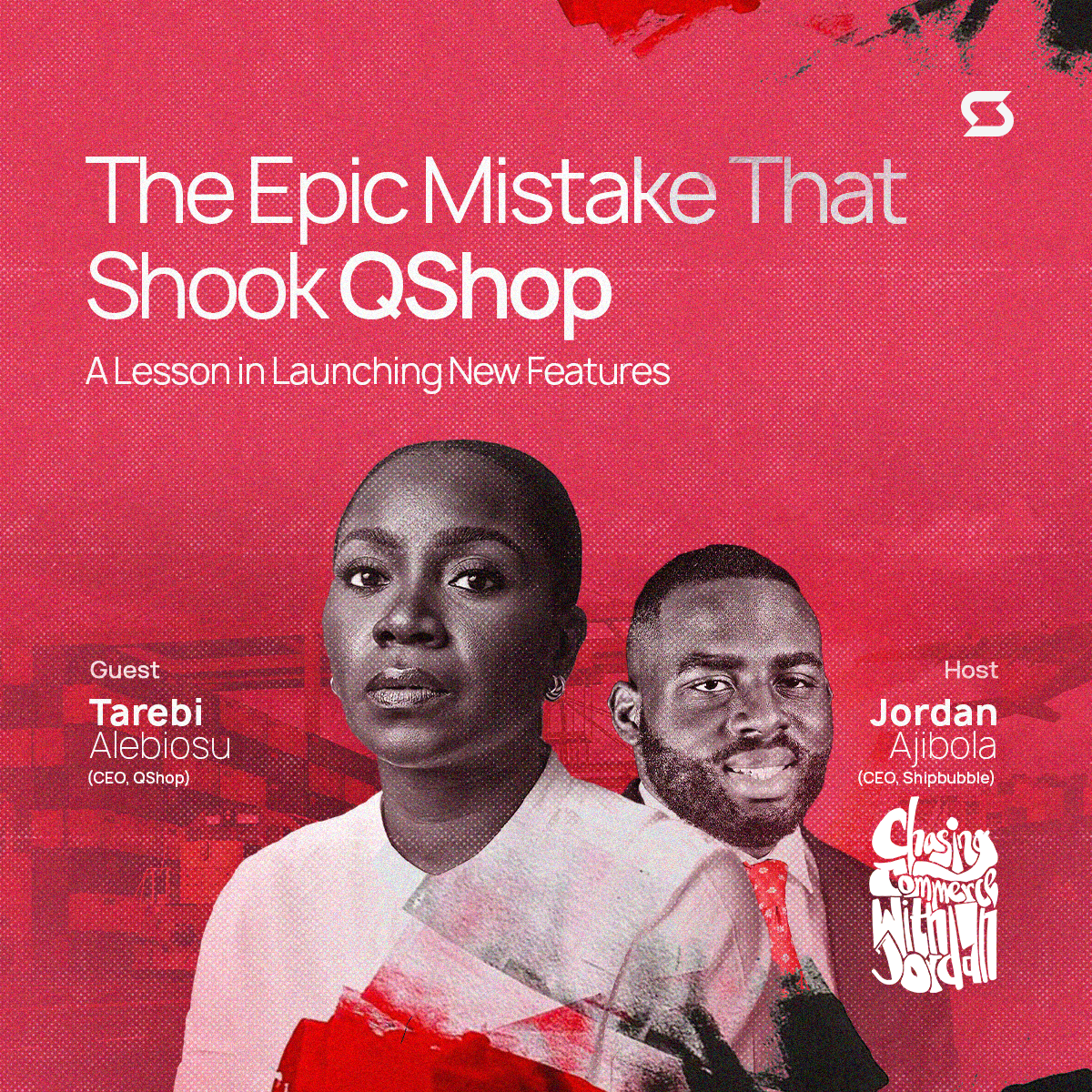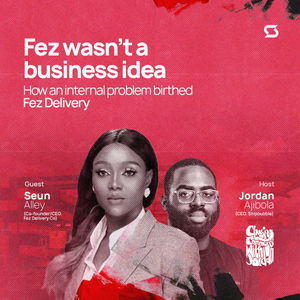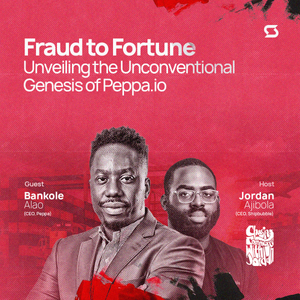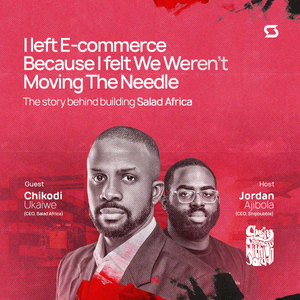"Chasing Commerce With Jordan" is a monthly interview series featuring the CEO of Shipbubble engaging in discussions with industry leaders. In this episode, Jordan sits down for a conversation with Tarebi Alebiosu, the CEO of QShop, to explore the latest trends, challenges, and opportunities in commerce and beyond.
Jordan Ajibola: Hi Tarebi, welcome to Chasing Commerce with Jordan. This is a platform where we will be discussing with lots of founders and folks driving growth in the African commerce industry, understanding their journey through e-commerce, and seeing how we can grow together. We can begin with an introduction.
Tarebi Alebiosu: Thanks a lot for this opportunity, Jordan. What you are building at Shipbubble is quite powerful, and I think there are a lot of similarities in our vision. My name is Tarebi Alebiosu. The vision that I have for QShop is to provide accessible e-commerce tools to small businesses across Africa that transform their businesses and help them structure and scale their businesses. QShop really gives business owners access to things that they may not ordinarily be able to afford or even understand.
I have a background in software engineering, and before this, I managed a company that built solutions for public and private sector clients. I did a lot of work with Lagos and Ekiti states.
I got the idea for QShop in 2020. During the pandemic, many of my personal contacts who run retail businesses reached out to me for e-commerce websites. When you're in anything tech-related, people come to you for everything. Whether it's fixing the TV or building something.
I wasn't eager to do it at first because it did not make sense to me, and I thought they already had enough solutions for that. So I referred them to Shopify, Wix, Ecwid, and other similar products. But they all came back with similar complaints. They found it complicated, wanted someone to set it up for them, and did not want to deal with international payments.
This made me realise that there was a gap I could fill. We got to work and released the MVP between late August and early September, and quickly grew to about 2,000 users in 3 months. We have evolved quite a bit since then, but I imagine that you have a similar story with Shipbubble. You start with one idea and think that will be it, but as they start to use your product, it evolves considerably.
That’s the journey of QShop so far.
Jordan Ajibola: Amazing. I think that's the same thing that's happened with Shipbubble. When we started, we just wanted to make logistics simple and cheap for e-commerce businesses. Then we realised that technology could not make it cheap in the short term. It's more of a longer-term play. That's why we evolved to this; connecting people to global commerce marketplaces. So for you, what has been the transition from where you started to where QShop is?
Tarebi Alebiosu: For starters, I didn't realise that Nigerians don’t like to pay for subscriptions (Laughs). We started with a subscription-only model and very quickly realised it was not going to work. In the case where a business doesn't make any sales, they just feel like you're cheating them. So, we updated it to a freemium model where you could come on for free, but of course, with some limitations: you just pay a higher transaction fee. So if you don't make any money, we don't make any money.
Another thing that we didn't realise was how much users would think what we did was a marketplace. So they expected the services of Konga or Jumia. Users would set up and say, nobody has bought from my store yet. But you have to share your link, put it in your Instagram bio, etc. So one of the things we started to do was offer digital marketing as a service for some of these businesses, and of course, a lot more education because the market was a lot younger than we thought.
Jordan Ajibola: Wow! Similar to Shipbubble, the pandemic really played a role in Nigerians seeing e-commerce as something that is really necessary. In the next couple of years, what trends are you seeing pop up in the e-commerce space?
Tarebi Alebiosu: I think there are many. There are some people already talking about things like conversational commerce. I think the new LLMs we have with Open AI are going to make that transition really smooth. I think a lot of startups are going to be showing some exciting things soon. We are already seeing things like embedded finance in e-commerce tools, BNPL, and loans for small businesses. In summary, my experience with QShop has taught me that if you build anything that directly helps a small business make money, you are golden.
And you actually spoke about one of the things earlier that Shipbubble is working on: connecting small businesses to global markets. I think that's something that's very major, and in between that is preparing small businesses for the global market.
Jordan Ajibola: Yes, yes. We at Shipbubble are always thinking about how we can help. There are two questions: do you build the road first, or do you ensure that the car can ride on the road? We are thinking more about building the road first and then helping your car drive on that road. Do you have any stories about a customer who started using QShop and whose business has grown quite significantly?
Tarebi Alebiosu: We have a few, but one that comes to mind is a business called Rallys Closet. She sells fashion accessories such as turbans and fabrics as well. When she came to us over two years ago, she registered but didn't launch her shop. She wanted us to build this and that, and we kept thinking, “with all these things she wants us to build, are we sure she’ll sell?” Well, we did it, and she came on board, and it's been remarkable how much volume she's done with her QShop store.
She's also been very tough on us. So much of our product development has been driven by businesses like hers. I remember another one telling us a few months ago that she didn't realise how much revenue she used to make because everything was so manual. But she was looking at her sales reports, and she didn't realise she did that type of volume. It's always lovely to hear these stories.
Jordan Ajibola: Yes, yes. Data is quite important, and people always underestimate it. Let's move it into logistics. What have been some of the things customers always complain about in terms of logistics?
Tarebi Alebiosu: We have a ton. We didn't touch logistics for a while because, honestly, we didn’t know where to start. It was a thing of: are we going to try to find the most popular logistics fulfilment companies and integrate them? Then you start to talk to them, only to find out they don't really have APIs. It was really fragmented. And so what we did initially was allow users to put in their shipping rates and handle the whole shipping process. It was not an ideal solution, but it worked for some people. So we had been talking to Shipbubble and other similar companies for close to a year, trying to figure out what the best fit was. You guys have a fantastic product, by the way. Our integration with Shipbubble just went live last week, and the messages that have been coming in are overwhelmingly positive.
Jordan Ajibola: Yeah, I'm very happy to hear that. I think that we are still building more, and we actually want to have a lot more integrations with QShop. My next question is, do you see a future where your e-commerce customers are selling globally, not just locally?
Tarebi Alebiosu: Absolutely. I mean, the Nigerian market is massive, and the rest of Africa is massive. If they can sell to the world, especially now that, unfortunately, the naira keeps depreciating, it will be awesome. People want to earn in other currencies, so I think that I see that. What I'm not sure about is whether they are ready, production-wise to deliver those volumes, but I definitely see us heading in that direction.
Jordan Ajibola: Building for customers requires a lot of trust. So far in your business with your customers, how have you been able to build trust and maintain it?
Tarebi Alebiosu: Building trust is an ongoing activity. It's not something you do once and stop. For us, who are very big on accountability, we admit when we mess up. We're not perfect, and we will never be a perfect organisation.
If there's something we have done where the fault is actually on us, we all meet to do everything we can to make amends, and it's not just discussing it internally. We do everything to resolve every issue, even if it involves our partners. We take the blame and do not throw our partners under the bus.
So an area that is very, very important to me at QShop is customer support or business support. We're checking in on the stores regularly, even if they're not making sales. We've done a lot of free webinars to educate them but also to build a connection with them because sometimes when you're behind the screen and all they're seeing from companies are emails and Instagram posts, they want to see a face. They want to talk to someone. We reward our top sellers as well.
We do everything that we can to show them that we are their partners in this journey.
Jordan Ajibola: That’s great. We take a similar approach here at Shipbubble. For us, you get an account manager, and you can reach out to them anytime you want to.Moving on, have you ever had a situation where your product isn't for the right audience and then you're receiving a lot of complaints?
Tarebi Alebiosu: Absolutely, it happens. We built the MVP in late 2020. That carried us through to the end of last year, and then we started working on version 2 of QShop sometime last year. Our version 2 was supposed to take a month or two, but it took longer. After we launched, we were hammered with statements like "we don’t like this" and “it is complicated”. A lot of that was a failure on our side to educate them because it was a completely different interface. So imagine you've been using Instagram or whatever for one year plus, and then all of a sudden you log in and everything looks different. There's no way, even if it's better, you wouldn’t push back.
So we learned a very big lesson there in terms of the way we roll out new features. We educate the businesses beforehand, and we support them. Because even if you send out 50 emails and do 50 information sessions, there are going to be businesses that say “you didn't tell me”. We don't take it personally anymore; we just keep educating and supporting.
Jordan Ajibola: A lot of the growth QShop has gone through sits on the shoulders of the CEO. How has that been generally, and what qualities have you used to navigate or had to learn that helped bring you this far?
Tarebi Alebiosu: This is a loaded question. I think the first thing that would help any founder is resilience and grit. Knowing that it's almost never going to go as you planned, you just have to keep going and keep adapting. And even when it feels like the entire house is falling down, which it feels like many times, you just have to keep going, as long as you still believe that this will work.
Your goal may not change, but the method may change. So, if you're using the analogy of building roads, we may not put the road here; maybe we put the road somewhere else to get to that same target because we find that this path isn’t viable
The second part is that, as a founder, you can’t do everything yourself. You need a great team, and you have to listen to the team. It can't just be you pushing out; you need that intellectual humility. Everybody on your team needs that as well and, to some extent, needs to feel heard. You want your vision to be everyone’s vision, not just Tarebi’s vision.
I think there's also a big element of luck because you can have all these things and then run out of money, don't raise any money, or don't have the right contacts for partnerships. And then, the final thing I would say is that yes, your startup is fantastic; it's great, but it's not you. I am not QShop; I have a life outside of QShop. I do this so that I don't feel weighed down in my entire life when things aren’t going well at QShop. I've gotten very good at compartmentalising and disconnecting from QShop when I need to.
And of course, this is also not my first rodeo, so it's a bit easier. It's very different and very difficult, but I didn’t start QShop thinking we were going to blow the next year. So I think having realistic expectations in mind has also helped.
Jordan Ajibola: Okay, that's good. I think that's a lot to take home. So I have two questions this time. The first one is for aspiring entrepreneurs looking to go into e-commerce or technology in Africa. What would you advise them to do with the competition out there or with all the challenges? Secondly, what would you advise anyone who wants to go into tech?
Tarebi Alebiosu: So that's a great question. I would say that aspiring entrepreneurs should do some research but don't get paralysed by the research. Jump in as quickly as you can because you're likely going to change that idea very quickly. And the only way you will learn is by doing, so I'll say jump in as quickly as you can. There are many things I have learned today that I learned by jumping in. I remember years ago, I had a client who wanted a BlackBerry app. I was like, yeah, I can do that, but I had never built a BlackBerry app before. I had to go do the reading and YouTube watching and all of that, and I delivered their BlackBerry app. So I would say to jump in.
For those who are interested in exploring a tech career, I think they need a bit of focus. Tech is very wide. So when people say, I want to work in tech, I don't really know what that means. Are you looking for a non-technical role? There are so many jobs in tech. It sounds like you're asking me to tell you what your interest in tech should be. Ask yourself these questions; What are my interests? What do I think I could enjoy doing? Try out different things and try out internships across various roles. When I was in university, I interned as everything—graphic designer, web developer, everything—until I found what I liked.
Also, learn. Courses go a long way, but again, balance. Don't sit down and do courses for two years because technology changes pretty quickly. What you learn today may not be relevant in a year. Don’t get so attached to one framework, especially if you are moving to a technical role. Do some learning, but get your hands dirty as quickly as possible.
Jordan Ajibola: Okay, thank you a lot. To add to that, maybe find a mentor—someone that you can learn from.
Tarebi Alebiosu: Absolutely. Absolutely.
Jordan Ajibola: Lastly, 5 to 10 years from now, what are your own additions, and how do you see QShop contributing to the general growth of commerce in Africa?
Tarebi Alebiosu: That's a very good question. Five or ten years from now, I see QShop powering and simplifying commerce for millions of businesses across Africa. I see e-commerce so accessible that it's no longer a major thought. I see QShop partnering with a lot of businesses like Shipbubble to give small businesses on QShop an immersively complete ecosystem that helps their businesses grow, thrive, and sell across borders.
Jordan Ajibola: That's a big goal, and we're looking forward to working with you for the next five, twenty years. We're going to be here. Hopefully forever. Thank you so much for this conversation. I really learned a lot.
Tarebi Alebiosu: Thank you too, Jordan, and have a lovely day.
Thank you for joining us in this insightful conversation! If you found this discussion engaging and informative, don't forget to connect with us on social media to stay updated on more exciting interviews, industry insights, and valuable content. Feel free to follow us on social media and be a part of our growing community. Your feedback and engagement are highly appreciated!





